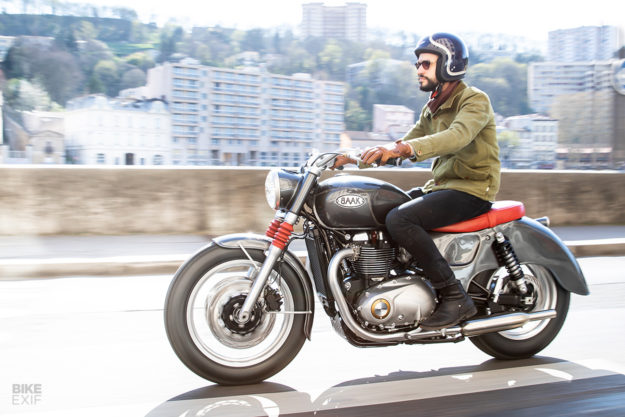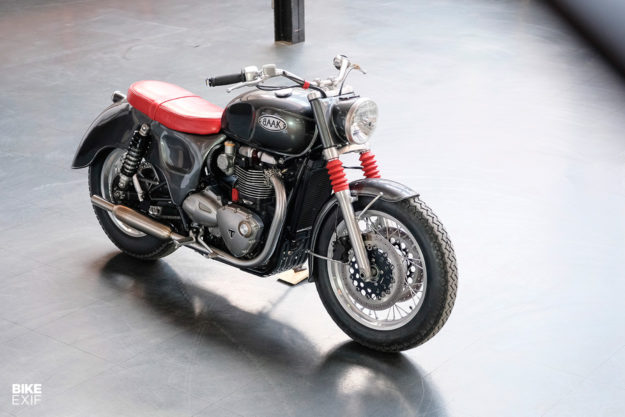
Triumph are great at recalling the past via the design of their modern day classics. But there’s one element Hinckley hasn’t brought back: the infamous ‘bathtub’ fairing.
Edward Turner’s idea to enclose the rear wheel first appeared on the 1957 Triumph 3TA ‘Twenty One,’ and later the 1959 5TA ‘Speed Twin.’ It was a move to offer superior weatherproofing for British riders—but it was a total flop in the States.
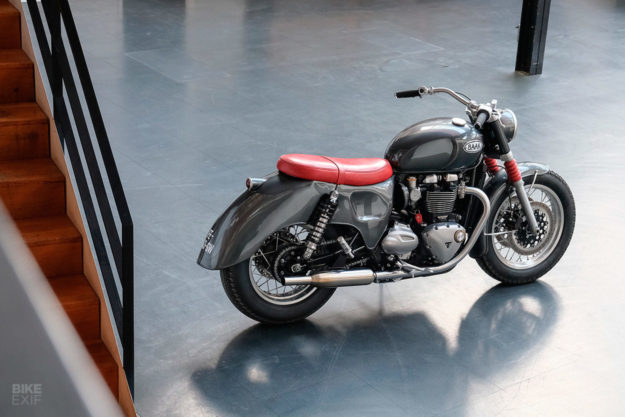
American customers at the time wanted bikes that were more stripped down. In California particularly (where rain is less of a problem), dealers would regularly rip off the bathtubs as soon as the bikes were delivered. Unsurprisingly, Triumph eventually abandoned the design.
But, as with all things vintage, what was a misstep back then is quirky and chic now. Which is why we love this reinterpretation of the Triumph bathtub, from French custom shop, BAAK Motocyclettes.
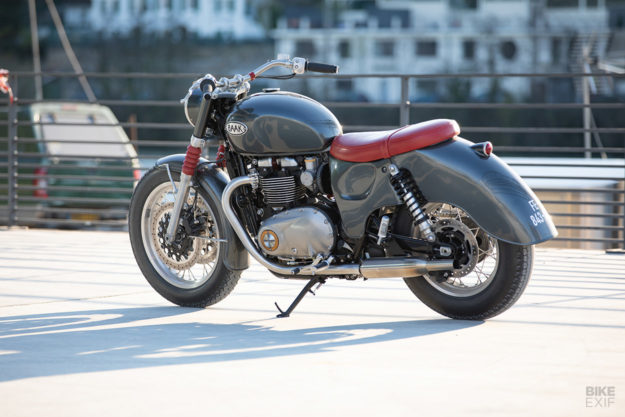
BAAK have been busy of late. Their twelve-person team has just moved into a spacious new workshop in the Lyon’s 9th arrondissement, where they produce a range of gorgeous bolt-on parts alongside their custom builds.
For this project, they acquired two bikes: a 2018 Triumph T120 Bonneville as a donor, and a 1962 Thunderbird as inspiration. And they did a bang up job: the new bike looks like a contemporary factory replica of its forebear.
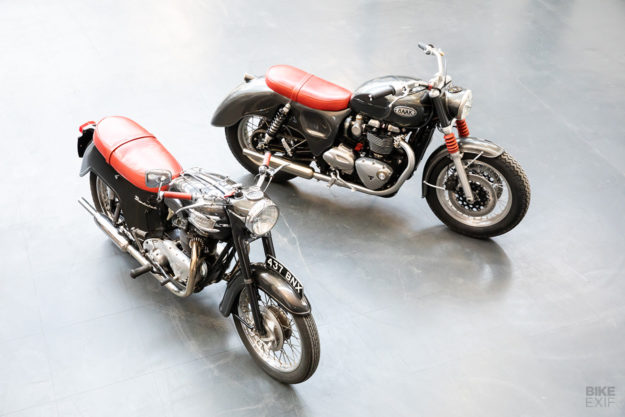
Unsurprisingly, the biggest job here was crafting that all-encompassing rear fender. The BAAK crew first tasked their designer with sketching it up—then reworked the sketches until they were fully satisfied. Then their metal-shaper Victor had his turn.
He started by building a physical mockup with cardboard. Then he cut, hammered, English-wheeled, TIG welded and hand-sanded the final aluminum structure. All told, it took roughly twenty-six days to finish the bathtub off.
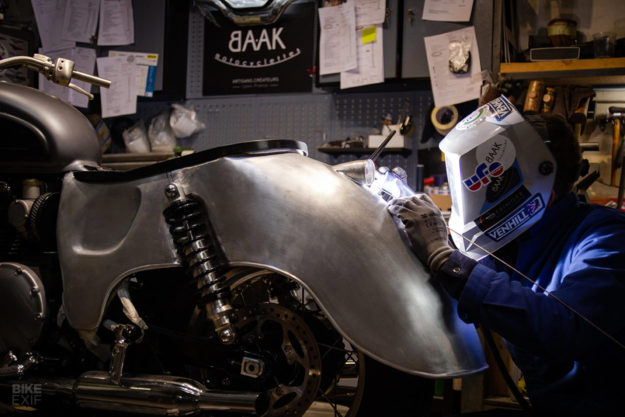
The structure sits on an aluminum subframe, with a red leather seat up top. The seat was shaped on a high-density polyethylene base, and upholstered in-house. Take a peek around back, and you’ll also notice that the tail light’s perfectly integrated into the fender.
The aluminum front fender was made from scratch too, along with a set of classy mounting struts, and a sump guard. A little further up, BAAK sunk a Motogadget speedo into a custom headlight bucket, equipped with Lucas optics.
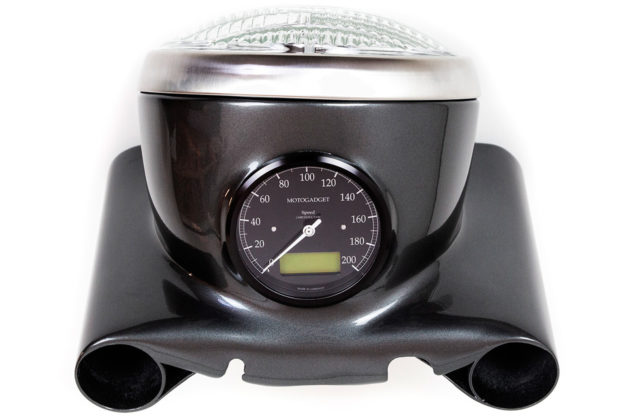
This was another tricky task. Triumph’s newest bikes can’t operate without certain widgets crammed into the OEM dials. So BAAK applied a little electronic wizardry by 3D printing an enclosure to hold and relocate the vital bits. They also fitted their own, machined aluminum switchgear.
The rest of the cockpit’s equipped with handlebars from BAAK’s own catalog, Biltwell Inc. grips, KustomTech levers, and Motogadget bar-end turn signals. The crew also installed a long cable kit for the wider bars, and a set of super-sano triple clamps.
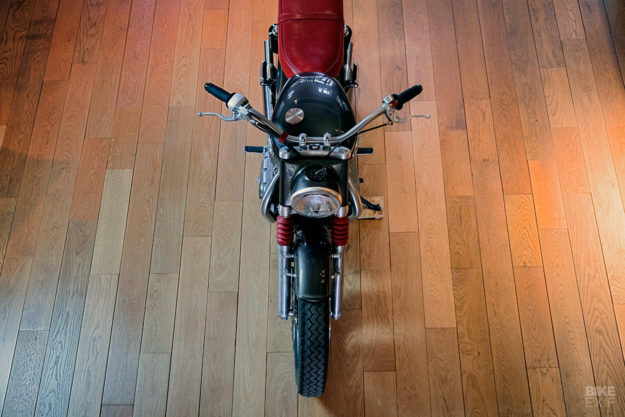
The ignition was relocated to the side of the bike, and the battery now lives in a custom-made aluminum box. New fork gators and custom leather cable loops add a few extra splashes of red.
The Bonneville has had a slight stance adjustment too. The front forks were shortened internally, and the rear shocks swapped out for a smaller set from Shock Factory. And there’s now an 18” wheel up front and a 16” in the rear, with Avon MKII tires and a Beringer front brake disc.
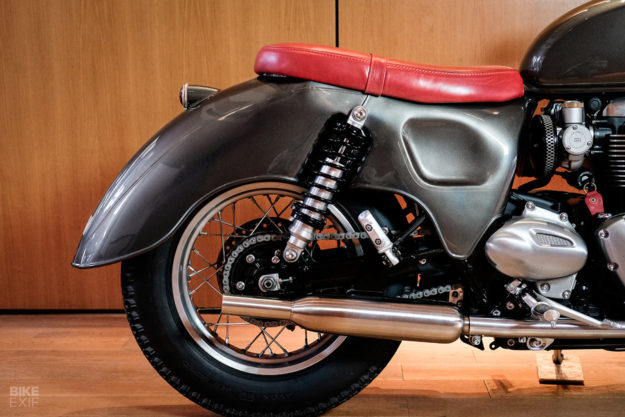
Brushed stainless steel silencers, and ‘camembert’ air filters, round out the parts list.
For paint, BAAK drew inspiration from the iconic Porsche 356. A warm pearl grey is complemented by super-subtle champagne pin striping, and a set of cast aluminum tank badges.
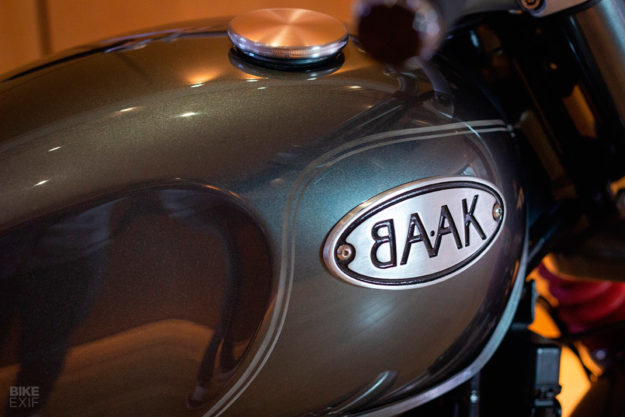
The T120 is a pretty solid performer out the box. And despite the generous weather protection, BAAK reckon this example is even lighter than stock. So although it’s taken styling cues from the early 60s, it goes, stops and turns a lot better.
It also has us wondering how well a factory-issued Triumph bathtub would fare today…
BAAK Motocyclettes | Facebook | Instagram
